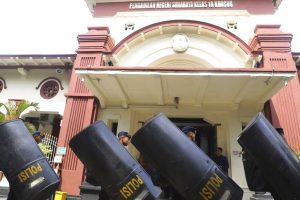An Indonesian court yesterday opened its trial against five men charged with negligence over their alleged roles in a recent crowd crush at a soccer stadium that killed 135 people. The incident, which occurred at a match in October at overcrowded Kanjuruhan stadium in Malang, East Java, has prompted fresh scrutiny of the training and professionalism of Indonesia’s police.
The crowd surge is believed to have taken place after police fired teargas to disperse fans who flooded the pitch in anger after the home team, Arema FC, was defeated by its arch-rival Persebaya Surabaya.
The court in Surabaya heard the charges of criminal negligence causing death and bodily harm against three police officials alleged to be responsible for the use of tear gas and the Arema FC Organizing Committee chair and security chief. If found guilty, the accused face up to five years imprisonment.
The tragedy at Kanjuruhan was the deadliest soccer-related incident since 328 people were killed in a 1964 crush at a stadium in Lima, Peru. An official fact-finding team, which included government officials, activists, and soccer and security experts, subsequently concluded that the that the “excessive” and “indiscriminate” use of tear gas by the police had set off a panicked run for the exits, several of which were locked. The investigation found that the police on duty were unaware that the use of tear gas as a crowd control measure is prohibited by soccer’s international governing body FIFA.
According to The Associated Press, the lead prosecutor Ari Basuki told the court yesterday the three police officers had given clear instructions to their subordinates to fire tear gas canisters to disperse the crowd. “They did not consider the risk factors,” Basuki said. “Their order to fire (tear gas) was a form of negligence and carelessness that built up the risk of a panicked crowd fleeing for exits of the stadium and a crush.”
A lawyer for the Arema FC Organizing Committee chair said his client denied all charges. “If there is negligence it should be on the police, who fired the tear gas, not us,” the lawyer said, Reuters reported.
After the incident, President Joko Widodo announced that all league matches would be suspended and that Kanjuruhan stadium would be demolished and rebuilt.
But the case concerns more than just the future management of soccer matches. The behavior of the officers assigned to the stadium highlighted longstanding and systemic issues with the Indonesian National Police: the proportionality of their tactics, the quality of their training, and broader accusations of impunity and corruption.
In some ways, the timing could not have been worse for the police force. Malang came on the heels of the bizarre murder of a junior policeman at the home of Inspector General Ferdy Sambo, a two-star general and the head of Internal Affairs for the Indonesian National Police. The case magnetized the Indonesian public and forced the police eventually to launch a thoroughgoing investigation into senior officials’ attempts to cover up the killing.
As Aisyah Llewellyn wrote for The Diplomat in October, the string of scandals threatened “to further erode trust in a force known for endemic corruption, violence, and cronyism.” This is a taint that accountability for the Malang tragedy will only partly scrub away.

































